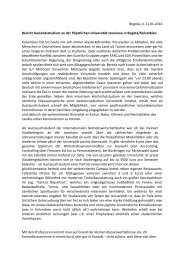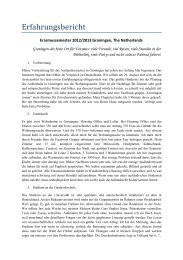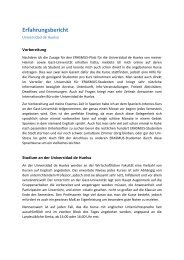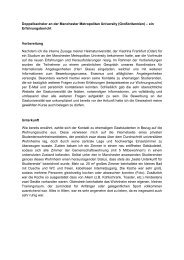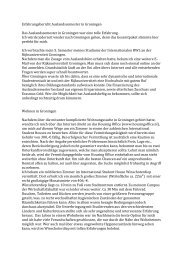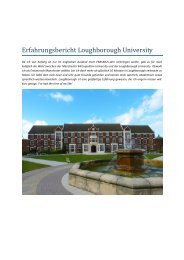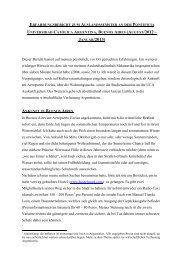Dariusz Aleksandrowicz Aleksandrowicz - Europa-Universität ...
Dariusz Aleksandrowicz Aleksandrowicz - Europa-Universität ...
Dariusz Aleksandrowicz Aleksandrowicz - Europa-Universität ...
You also want an ePaper? Increase the reach of your titles
YUMPU automatically turns print PDFs into web optimized ePapers that Google loves.
D. <strong>Aleksandrowicz</strong>: The Socialist City and its Transformation 9<br />
“We still do not have a centre, since the design of the centre turned out to be very<br />
expensive. It therefore extended the available means. Besides that, we simply lacked<br />
technical possibilities to realize it. It should be the task of future - when we will<br />
have more means to make it even better and perfect.” 18 The other reason why the<br />
centre hasn’t been constructed, however, was, according to Stepanovitsh, the lack of<br />
real demand. Priority, therefore, was given to dwelling space. “You see, the city can<br />
exist and function well without a centre. You in fact don’t need any such centre in the<br />
usual practice which takes place in the space determined by the objectives of working,<br />
shopping and living.” (Stepanovitsh).<br />
Looking at the issue in the light of strategies social actors implement in order to<br />
adapt to the existing reality, there are, I think, the following conclusions which can<br />
be derived from it: On the one hand, what we face here is, as it were, a “reverse<br />
adaptation”; that is, adaptation of a somehow sophisticated project to the very norm<br />
of Communism. According to the logic of the system as expressed in the urban space,<br />
there was no reason for such a centre to be really constructed. On the other hand, we<br />
can speak here of adaptation to the provisory reality determined by the failure to<br />
realize the plan. The adaptation concerns both behaviour and mentality as well as<br />
related rationalizing schemes of ideology, and with it – the planning authority itself<br />
which now attempts to interpret the failure in terms of pragmatically correcting the<br />
plan.<br />
The original project in question reflected the nature of Communism, as far as it<br />
turned out to be an imaginary state of things, never to approximate in reality. What<br />
the reality of Communism in fact was like, was a more or less chaotic building site<br />
with all the provisional and imperfect arrangements common to it. As long as the<br />
institutional and ideal framework of Communism persisted, the building site, however,<br />
had some “meaning” referring to what was intended to develop out of it. This<br />
very reference at the same time contributed to somehow “transcending” all the misery<br />
of what actually existed. In this respect, it was just like any ordinary building<br />
site, where we relativize the imperfectness or even ugliness of what is now given<br />
by relating it to the final result as presented in the underlying design. When the image<br />
of an expected future finally disappears, the sole reality one faces and lives in is<br />
reduced to the actually existing misery of provisory arrangements. The type of<br />
adaptation we face here, mainly consists in considering the conditions that resulted<br />
from the failure of the previous illusions as stable reference points for the practice of<br />
life. To be sure, this attitude is more rational than commitment to the communist<br />
myth. But it is a very poor base for a creative evolution.<br />
the original plan was abandoned. In effect, huge swimming pools were constructed in a part of the<br />
city where there live only few people.<br />
18 Stepanovitsh. Admittedly, the “failure to create a centre”, as referred to in Szczepañski (1993b:<br />
153), was not restricted to Russia, but was an usual feature of new “socialist cities” in the Soviet<br />
bloc. Cf. also Szczepañski (1990: 52).



